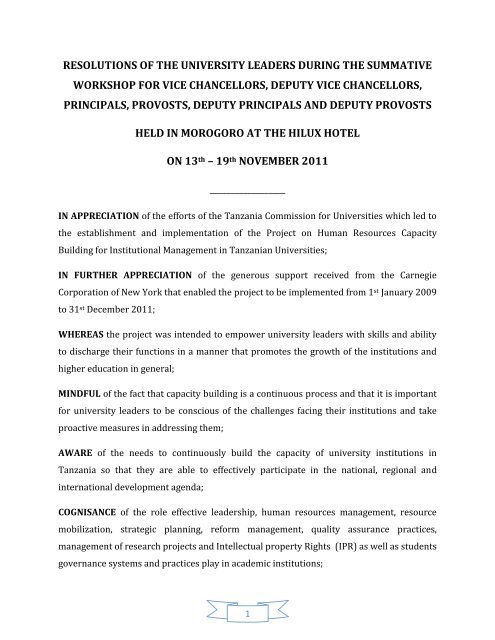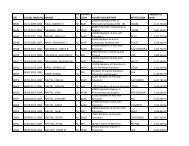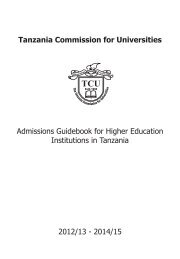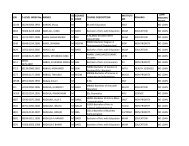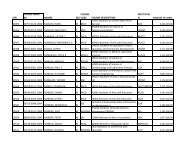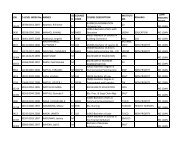Leadership Workshops - Tanzania Commission for Universities
Leadership Workshops - Tanzania Commission for Universities
Leadership Workshops - Tanzania Commission for Universities
You also want an ePaper? Increase the reach of your titles
YUMPU automatically turns print PDFs into web optimized ePapers that Google loves.
RESOLUTIONS OF THE UNIVERSITY LEADERS DURING THE SUMMATIVE<br />
WORKSHOP FOR VICE CHANCELLORS, DEPUTY VICE CHANCELLORS,<br />
PRINCIPALS, PROVOSTS, DEPUTY PRINCIPALS AND DEPUTY PROVOSTS<br />
HELD IN MOROGORO AT THE HILUX HOTEL<br />
ON 13 th – 19 th NOVEMBER 2011<br />
__________________<br />
IN APPRECIATION of the ef<strong>for</strong>ts of the <strong>Tanzania</strong> <strong>Commission</strong> <strong>for</strong> <strong>Universities</strong> which led to<br />
the establishment and implementation of the Project on Human Resources Capacity<br />
Building <strong>for</strong> Institutional Management in <strong>Tanzania</strong>n <strong>Universities</strong>;<br />
IN FURTHER APPRECIATION of the generous support received from the Carnegie<br />
Corporation of New York that enabled the project to be implemented from 1 st January 2009<br />
to 31 st December 2011;<br />
WHEREAS the project was intended to empower university leaders with skills and ability<br />
to discharge their functions in a manner that promotes the growth of the institutions and<br />
higher education in general;<br />
MINDFUL of the fact that capacity building is a continuous process and that it is important<br />
<strong>for</strong> university leaders to be conscious of the challenges facing their institutions and take<br />
proactive measures in addressing them;<br />
AWARE of the needs to continuously build the capacity of university institutions in<br />
<strong>Tanzania</strong> so that they are able to effectively participate in the national, regional and<br />
international development agenda;<br />
COGNISANCE of the role effective leadership, human resources management, resource<br />
mobilization, strategic planning, re<strong>for</strong>m management, quality assurance practices,<br />
management of research projects and Intellectual property Rights (IPR) as well as students<br />
governance systems and practices play in academic institutions;<br />
1
DESIROUS to take full advantage of the In<strong>for</strong>mation Communication and Technology (ICT)<br />
<strong>for</strong> institutional prosperity;<br />
CONCERNED by the gender imbalance that exists in the university institutions academic<br />
and leadership positions;<br />
UPHOLDING the management ethics that are critical and necessary to enable the<br />
university institutions address and promote the objectives of higher education nationally,<br />
regionally and globally; and<br />
COMMITTING university institutions to continued capacity building in different areas that<br />
are critical <strong>for</strong> the attainment of the higher education objectives;<br />
NOW THEREFORE, we university leaders resolve as hereunder:<br />
PART B: RESOLUTIONS<br />
1. <strong>Leadership</strong> in academic institutions<br />
a. Each university institution should be led in accordance with its Charter granted<br />
or approved by the President in accordance with the <strong>Universities</strong> Act and that<br />
<strong>for</strong> university institutions which are yet to submit their Charters in accordance<br />
with the <strong>Universities</strong> to do so by 2012/13 academic year.<br />
b. Each university institution should organize and execute its functions in a manner<br />
that will attain the national aspirations <strong>for</strong> higher education.<br />
c. Each university institution should have in a place a leadership development<br />
policy and mechanism <strong>for</strong> training and development of its leaders at all levels. In<br />
this regard existing University Institutions should have such a Policy by 2013.<br />
d. The <strong>Commission</strong>, in collaboration with university institutions, should design and<br />
put in place a postgraduate leadership so as to strengthen the university<br />
leadership in the country.<br />
e. Each university institution should constantly review its policies on appointment<br />
of university leaders so as to take into account the changing needs and<br />
2
circumstances in university leadership and ensure that university positions are<br />
handled by competent, proactive and entrepreneurial academicians and<br />
administrators, and encourage them to take up leadership positions as and when<br />
they are earmarked <strong>for</strong> appointment<br />
f. Each university institution should adopt gender mainstreaming policies both at<br />
institutional and unit levels and implement strategies (including embracing<br />
affirmative action, where appropriate) that would help increase the pool of<br />
women candidates <strong>for</strong> teaching and leadership positions in the institutions. In<br />
the same regard, each university institution should maintain gender based data<br />
to gauge and monitor that progress is being made in the move towards gender<br />
equity by 2013/14 academic year.<br />
g. Each existing university institution should adopt the per<strong>for</strong>mance management<br />
approach by 2013/14 so that leaders are assessed on the per<strong>for</strong>mance<br />
agreements rather than the current system where no per<strong>for</strong>mance targets are<br />
set on appointment in some institutions.<br />
h. Each university institution should be proactive and put in place, by 2013/14<br />
academic year, mechanisms <strong>for</strong> mobilizing resources from different sources to<br />
finance its operations.<br />
i. Each university institution should review, by 2013/14 academic year, its<br />
governance and management structures and tools so as to enhance<br />
decentralization of power and functions in the institution, this being in line with<br />
the requirements of the <strong>Universities</strong> Act. In particular, Departments must play a<br />
leading role in ensuring that the university mission and programmes are<br />
attained and that they should be properly resourced in order to effectively play<br />
that role.<br />
j. Each university should work towards sustaining academic freedom and<br />
academic responsibility in the current political climate where politicization of<br />
university institutions is growing.<br />
k. The <strong>Commission</strong>, in collaboration with university institutions and industries,<br />
should come up with better modalities <strong>for</strong> increasing the enrolment of students<br />
in mathematics, science, technology and innovations programmes by 2012/13<br />
3
academic year. In the same regard, university institutions should continue to<br />
work with the Government and industries to design and implement various<br />
measures aimed at attracting and thereby increasing the pool of students <strong>for</strong><br />
mathematics, science, technology and innovations programmes.<br />
l. Each university institution, in collaboration with the <strong>Commission</strong>, should work<br />
out modalities of strengthening university industry linkage so as to enhance the<br />
delivery of university education in <strong>Tanzania</strong>, including issues related to research<br />
and practical training.<br />
m. The <strong>Commission</strong> in collaboration with university institutions should<br />
explore the possibilities of putting in place a system <strong>for</strong> training on university<br />
leadership and development.<br />
2. Human Resources Management<br />
a. University institutions must come up with arrangements on how they can share<br />
academic staff across universities in a manner that is legal and sustainable and<br />
that the <strong>Commission</strong> should facilitate the process (design regulations on staff<br />
exchange or sharing) so that the <strong>Universities</strong> Act and respective Charters are not<br />
violated.<br />
b. Each university institution should regularly review working conditions, staff<br />
remuneration and incentive packages so as to attract and retain qualified staff<br />
<strong>for</strong> its mission and programmes.<br />
c. The <strong>Commission</strong>, in collaboration with public universities, should continue to<br />
dialogue with the Government so that the issue of extension of retirement age to<br />
65 years (voluntary) and 70 years (compulsory) is decided on as soon as<br />
possible so as to do away with the current practice of engaging retired<br />
academicians on contracts.<br />
d. Each university institution should put in place a system of spotting, mentoring<br />
and developing the university outstanding talents so as to be able to create a<br />
pool of potential members of staff in accordance with the institution’s succession<br />
plan.<br />
4
e. Each university should put in place or strengthen existing mechanism <strong>for</strong><br />
capacity building of its staff in teaching, research, consultancy and development<br />
(further studies) skills.<br />
f. The <strong>Commission</strong>, in collaboration with university institutions, should review the<br />
existing system, put in place and en<strong>for</strong>ce a better harmonized system of staff<br />
recruitment, development and promotion so as to address the current practices<br />
that have tended to differ from one institution to another and thereby creating<br />
complaints among staff in different institutions.<br />
3. Resource mobilization<br />
a. University institutions in collaboration with the <strong>Commission</strong> should find<br />
mechanisms that will enable them to reduce dependence on subventions from<br />
the government and/or students loans and fees system. The modalities should<br />
include establishing and strengthening linkages with industries and other<br />
research related bodies and commercialization of research results across and<br />
outside the country.<br />
b. Vice Chancellors, Principals and Rectors should play a more proactive role in<br />
resource mobilization <strong>for</strong> their respective institutions and should regularly<br />
improve their mobilization and entrepreneurship skills. In this regard, they<br />
should engage different stakeholders on resources and be cognizance of the fact<br />
that funding agencies are likely to support institutions that are making selfinitiative.<br />
c. Each university institution should be conscious of the rising cost of delivering<br />
higher education and thus establish a fundraising office and equip it with staff<br />
who have the right knowledge and skills on entrepreneurship matters.<br />
d. Each university institution should put in place a mechanism that will enable it to<br />
utilize its alumni so that they become potential contributors to the development<br />
of the institution. The engagement of the alumni should start from the time they<br />
are students so that they see the value and benefit of continuing to be associated<br />
with the development of their alma mater.<br />
5
e. The government should complete the student unit cost study so that the<br />
outcome of the study helps university institutions to determine the appropriate<br />
fees to be charged <strong>for</strong> each programme.<br />
f. The <strong>Commission</strong>, in collaboration with university institutions and other research<br />
stakeholders, should develop a capacity building programme on skills <strong>for</strong> writing<br />
fundable/project proposals as well as <strong>for</strong> the development of research<br />
infrastructure in order to enable the institutions attract funds and other<br />
resources.<br />
g. Each university institution should ensure that there is a proper balance between<br />
the teaching load and engagement of staff in other university income generating<br />
activities so that students do not suffer as a consequence of staff over<br />
engagement in such activities. In this regard, the <strong>Commission</strong> in collaboration<br />
with University institutions should review the existing load standards and<br />
develop minimum standards <strong>for</strong> teaching, research and public services.<br />
4. Strategic Planning and Re<strong>for</strong>m Management<br />
a. In order to become competitive universities of the future, the current university<br />
institutions should change their mindset so that they provide quality education<br />
that is relevant to the society they serve as well as the regional and international<br />
development agenda.<br />
b. Each university institution, in developing its strategic plan, should involve all<br />
members of the institution and other strategic stakeholders. The strategic plan<br />
should be SMART and derived from a comprehensive SWOC analysis so as to<br />
address strategic issues and enable the university institution to cut-a-niche.<br />
c. Each university institution should plan, budget and allocate adequate resources<br />
towards the attainment of the core functions of the institution as per the<br />
strategic plan.<br />
d. Each university institution should participate in matters of national interest and<br />
thus direct their activities towards the realization of the national, regional and<br />
global visions <strong>for</strong> socioeconomic development.<br />
e. University institutions, in collaboration with the <strong>Commission</strong>, should establish<br />
multi-disciplinary consortia to address key strategic issues of national interest.<br />
6
f. In view of the growth and development of the EAC, SADCand beyond, university<br />
institutions in collaboration with the <strong>Commission</strong>, should work towards<br />
accessing the wider higher education area in the EAC, SADC and beyond the<br />
regions rather than continuing with the practice of pursuing only domestic<br />
opportunities.<br />
g. Considering the growth in secondary education in the country and the growing<br />
number of students who will wish to join higher education in future, each<br />
university institution should take this aspect into accounts in its Master Plan so<br />
as to ensure the attainment of a sustainable and quality growth of higher<br />
education in the country.<br />
5. Quality Assurance Practices in Higher Education<br />
a. The <strong>Commission</strong> in collaboration with university institutions should, by<br />
2013/14 academic year, put in place and implement a quality assurance<br />
framework. The framework should take into account other national, regional<br />
and international initiatives on quality assurance, in particular the IUCEA quality<br />
assurance initiatives aimed at establishing the EAC common higher education<br />
area.<br />
b. Each university institution should put in place a quality assurance policy and<br />
quality management plan. In this regard, each institution should ensure that it<br />
develops and embraces the quality assurance culture so that quality assurance<br />
becomes one of the pillars of the provision of university education by the<br />
institution rather than an external requirement by the regulatory bodies.<br />
c. Each university institution, in collaboration with the <strong>Commission</strong>, should<br />
integrate soft skills – communication skills, interpersonal skills, social skills,<br />
interview and negotiation skills, confidence building, reporting skills, etc - to<br />
staff and students. The integration of soft skills should be part of the curricula<br />
development, review, validation and approval process.<br />
d. Each university institution, in collaboration with the <strong>Commission</strong>, should ensure<br />
that students become responsible <strong>for</strong> their own learning as a way of improving<br />
their own skills and competencies. On its side, the university institution should<br />
ensure it facilitates the student centered learning process by designing its<br />
7
curricula and preparing its staff along the principles of competency based<br />
teaching and learning.<br />
e. The <strong>Commission</strong> in collaboration with education stakeholders should, by<br />
2013/14 academic year complete the development of the long awaited National<br />
Qualifications Framework.<br />
f. The <strong>Commission</strong>, in collaboration with university institutions, should <strong>for</strong>m a<br />
special task <strong>for</strong>ce that would look at all issues related to education in general<br />
with a view to <strong>for</strong>ecast the implications of increased demand on education and<br />
unprecedented high enrollments in both primary and secondary schools to<br />
higher education. That task <strong>for</strong>ce should also propose possible scenarios and<br />
advice the government, university institutions and other education stakeholders<br />
on the appropriate scenario to address this issue.<br />
g. <strong>Universities</strong> should not be restricted to the GPA score as the only criterion <strong>for</strong><br />
recruitment of academic staff. Other mechanisms and criteria should be devised<br />
to be able to identify competent candidates <strong>for</strong> academic positions.<br />
h. In view of the increasing demand <strong>for</strong> higher education, the <strong>Commission</strong> in<br />
collaboration with university institutions should put in place a mechanism to<br />
guide the process of expansion so as to ensure that quality of higher education is<br />
not compromised.<br />
i. Each university institution in collaboration with the <strong>Commission</strong> should put in<br />
place mechanisms that will address issues of plagiarism and cheating including<br />
addressing the practice that seem to be emerging of people who write projects,<br />
papers, dissertations and theses <strong>for</strong> students. Among the mechanisms to be used<br />
should include establishment by the <strong>Commission</strong> of the central system <strong>for</strong><br />
storage of dissertations and theses so that it possible to tract and verify<br />
originality of projects, papers, dissertations and theses.<br />
6. Management of Research Projects and IPR<br />
a. University institutions, in collaboration with the <strong>Commission</strong> and other research<br />
stakeholders should put in place modalities <strong>for</strong> joint/collaborative research in<br />
different fields. In this regard, university institutions in <strong>Tanzania</strong> should take full<br />
8
advantage of the national, regional and international research opportunities<br />
offered by different organisations.<br />
b. The <strong>Commission</strong> should carry out a study on research profiles and ability of<br />
university institutions to do funded research and thereafter put in place a<br />
mechanism to encourage university institutions to do more funded research in<br />
different fields. The mechanism could include a minimum number of research<br />
output per a specified period.<br />
c. The <strong>Commission</strong>, in collaboration with university institutions, should promote<br />
awareness on IPR issues as well as put in place a framework <strong>for</strong> IPR<br />
management. The framework should include IPR policies and registration of the<br />
Intellectual Property.<br />
d. Each university institution should vigorously pursue the national research<br />
agenda and constantly engage with the National Planning <strong>Commission</strong> as well as<br />
the <strong>Commission</strong> <strong>for</strong> Science and Technology so that priority research issues are<br />
addressed <strong>for</strong> national prosperity.<br />
e. Each university institution, in collaboration with the <strong>Commission</strong>, should fully<br />
participate in different initiatives aimed at improving the ability of university<br />
institutions to take advantage of different research opportunities.<br />
f. Each university institution should disseminate research findings and thereby put<br />
research findings into use through commercilisation and solving the challenges<br />
the society is facing in the area the subject of the research as well as<br />
establishment of incubators.<br />
g. The re<strong>for</strong>ms that the government is carrying out in the area of Science,<br />
Technology and Innovations (STI) should be concluded so that university<br />
institutions take advantage of research opportunities available in the area of STI<br />
area.<br />
7. ICT <strong>for</strong> Institutional Prosperity<br />
a. Given the ever increasing number of students enrolled in higher education,<br />
university institutions should make use of ICT to facilitate the teaching and<br />
learning. This entails that each university institution should be innovative and<br />
9
adopts use of ICT in teaching to accommodate the increased enrolment of<br />
students without compromising quality.<br />
b. Each university institution should properly train both students and staff<br />
<strong>for</strong> proper management and sustainable use of the ICT infrastructure. In this<br />
regard each university institution should provide students and staff with<br />
adequate access to the ICT resources.<br />
c. Given the limited ICT resources, university institutions should explore<br />
ways <strong>for</strong> networking and sharing the available ICT resources among themselves.<br />
d. Each university institution should put in place an institutional ICT master<br />
plan and policy by 2013/14 academic year and also regularly monitor and<br />
manage the human-ICT interface. In that regard, each university institution<br />
should recruit and train competent staff to manage ICT resources.<br />
e. Each university institution should regularly use and keep its websites<br />
updated as websites are an essential communication and marketing tool.<br />
8. Gender issues in <strong>Universities</strong><br />
a. Each university institution, in collaboration with the <strong>Commission</strong>, should<br />
put in place a gender policy and strategies to attain gender balance in a<br />
sustainable manner.<br />
b. Each university institution should adopt gender mainstreaming policies<br />
both at the institutional and departmental levels and implement strategies that<br />
would help increase the pool of women candidates, including embracing<br />
affirmative action where appropriate.<br />
c. University institutions should adopt and implement gender responsive<br />
budgeting as part of their general institutional budget.<br />
d. The Government should keep on strengthening strategies that address<br />
gender issues in education at all levels.<br />
9. Students Governance Systems and Practices<br />
a. Each university institution should handle matters related to students<br />
governance in accordance with the <strong>Universities</strong> Act, its approved or granted<br />
Charter as well as regulations made <strong>for</strong> that purpose.<br />
10
. Each university institution should ensure that it puts in place conducive<br />
teaching and learning environments <strong>for</strong> its students and staff and make sure that<br />
student and staff are timely in<strong>for</strong>med of all matters that affect them.<br />
c. Each university institution should regularly build the capacity of student<br />
leaders so that they are able to productively participate in the management and<br />
development of higher education nationally, regionally and globally.<br />
d. The <strong>Commission</strong> in collaboration with university institutions should<br />
carry out a systematic study of students attitudes, values and aspirations in<br />
order to better understand their behaviors and put in place appropriate<br />
mechanism to foster harmony in the provision of university education.<br />
e. Each university institution should ensure that students do not engage in<br />
political party activities in university institution. However, students should be<br />
free to engage in political party activities outside the premises of a university<br />
institution.<br />
10. Management Ethics<br />
a. Each university institution should put in place and use an institutional<br />
code of ethics <strong>for</strong> staff and students.<br />
b. Each University Institution should address in a holistic manner the ethical<br />
issues related to teaching, research and consultancy and the way such issues<br />
impact on the delivery and management of higher education in the country.<br />
c. In order to impart ethical values to students, there in need to mainstream<br />
ethical issues in all university programmes.<br />
11. Crosscutting Issues<br />
a. The <strong>Commission</strong> in collaboration with university should put in place<br />
mechanism that will ensure equity in the enrollment of<br />
disadvantaged/marginalized group into higher education.<br />
b. University institutions should ensure equity in the enrolment of students<br />
and recruitment of staff without any <strong>for</strong>m of discrimination. Thus they shall<br />
ensure that there is in place mechanisms <strong>for</strong> broadening diversity, equity and<br />
equality in the provision of university education.<br />
11
c. Each university institution should collaborate with the Higher Education<br />
Students Loan Board to ensure effective disbursement and recovery of loans. In<br />
this regard, university institutions should collaborate in with the Higher<br />
Education Students Loan Board in the development of a system <strong>for</strong> effective<br />
loans management.<br />
d. Each university institution should ensure that its staff promote the<br />
objectives of higher education and otherwise do not engage in activities which<br />
may frustrate or inhibit university operations and activities.<br />
12. Institutionalisation and sustainability of the Project<br />
a. The <strong>Commission</strong> in collaboration with the Committee of Vice Chancellors,<br />
Principals and Provosts (CVCPT) and the university institution should design<br />
and develop the plans and programmes <strong>for</strong> the next three years on capacity<br />
building.<br />
b. The <strong>Commission</strong> should create a budget line and set aside some funds to<br />
be used <strong>for</strong> the purpose of university institutions capacity building programmes.<br />
In the same regard, each university institution should set aside adequate funds<br />
to cater <strong>for</strong> capacity building programmes as are organized by the <strong>Commission</strong><br />
from time to time on different modules.<br />
c. The <strong>Commission</strong>, in collaboration with university institutions, should<br />
continue dialogue with development partners and other financing institutions so<br />
as be able to secure the needed financial support <strong>for</strong> various capacity building<br />
programmes <strong>for</strong> the benefit and growth of higher education.<br />
d. In the meantime the interaction between the <strong>Commission</strong> and the<br />
university institutions and that the financing of that interaction could be<br />
financed through the following scenarios:<br />
Scenario 1<br />
<strong>Universities</strong> meet the cost of transport and accommodation<br />
TCU to cover administrative cost<br />
The venue <strong>for</strong> training be centralized<br />
Training be in Modular <strong>for</strong>m<br />
Scenario 2<br />
12
<strong>Universities</strong> meet the cost of transport and accommodation<br />
TCU to cover administrative costs<br />
The venue <strong>for</strong> the training be decentralized (in zonal basis) <strong>for</strong> groups<br />
with large number of staff such as Heads of Departments and future<br />
potential leaders (including upcoming females)<br />
Training be in Modular <strong>for</strong>m<br />
Scenario 3<br />
Strengthening of TCU resource Centre, develop and establish e-learning<br />
modules.<br />
<strong>Universities</strong> develop programmes in University <strong>Leadership</strong> and<br />
Management at least at Post graduate level<br />
Scenario 4<br />
Combination from the Scenarios above<br />
13. Summary of recommendations and Way Forward<br />
a. The <strong>Commission</strong> should compile all the resolutions emanating from this<br />
workshop and the workshop which will start from to 13 th to 18 th November<br />
2011 and circulate them to all university institutions.<br />
b. The <strong>Commission</strong>’s Project Implementation Team should analyse the<br />
resolutions and come up with implementation plan of the resolutions by June<br />
2012. In the same regard university institutions should also prepare their<br />
implementation plans and share them with the <strong>Commission</strong> by June 2012.<br />
c. Each university institution should complete the questionnaire circulated<br />
by ERA on project evaluation and submit completed questionnaires back to ERA<br />
by 30 th November 2011.<br />
13


